“Jim Autry is somewhat of a legend in this town. … But I know him best as a husband and father, and in those arenas, he excels as well.”
Sally Pederson on James A. Autry
“There is no one else I know who has given up so much precious time to care for others in addition to her own family.”
Joe Henry on Mary Campos
“An independent thinker, she vigorously champions any cause she supports with wisdom, grace and grit.”
Mary Riche on Joy Corning
“His greatest desire is to bring predictability to others. To the Des Moines metro area, to his legal clients, to the people he serves, E.J. aspires to bring stability.”
Robert Brownell on E.J. Giovannetti
“On a big-picture scale, his example has shown me that seemingly impossible achievements can be reached through determination, vision and an incredible work ethic.”
Michael Egel on Robert Larsen
“His efforts in Congress represent the Iowa values of hard work and common sense. … His positive impact on national public policy can’t be overstated.”
Former Gov. Chet Culver on Neal Smith
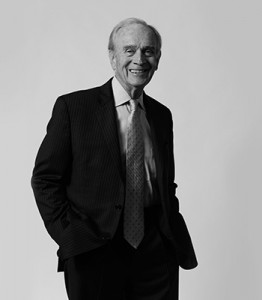 James A. Autry
James A. Autry
Author and poet; former Meredith Corp. executive
Written by Sally Pederson
Jim Autry is somewhat of a legend in this town, a successful executive at Meredith Corp., an author of 11 books, an international
speaker and consultant on servant leadership, a poet and a musician. But I know him best as a husband and father, and in those arenas, he excels as well.
His three sons range in age from 30 to 56. With each, he has a close and loving relationship, spending time one-on-one on a weekly basis. I am not sure his sons would refer to him as a sage, but they each look to him for advice and counsel in their lives.
As his spouse, I’ve especially grown to appreciate how his love of poetry has enhanced our lives. Our library shelves are thick with poetry books, and sometimes on a quiet evening, Jim and I settle in with a glass of wine while he reads from some new book by a well-known poet or a recently discovered one. To my great joy, I sometimes receive a beautiful sonnet from Jim tenderly composed for a special anniversary.
His favorite poets often become mine. One such poet is Mary Oliver. Her poem, “The Summer Day,” has a line I am fond of quoting: “What is it you plan to do with your one wild and precious life?” I can’t help reflecting on the gratitude I feel that my husband has chosen to spend at least a portion of his “wild and precious life” as a poet. That choice has certainly enriched my life and that of so many others.
Sally Pederson was lieutenant governor of Iowa from 1999 to 2007. Part of the above story was excerpted from Autry and Pederson’s new book, “Choosing Gratitude 365 Days a Year.”
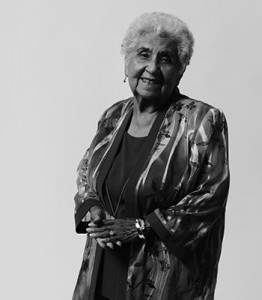 Mary Campos
Mary Campos
Social justice activist
Written by Joe Henry
Mary Campos has touched the lives of hundreds, if not thousands, of Latinos, youths and women in Iowa. A tireless worker, she has devoted her entire life to improving the well-being of others. At 84, Mary is still going strong, each day serving the community in some capacity, whether tutoring youths, teaching citizenship classes or helping at her church.
My mother knew Mary at a young age, and I’ve known her my entire life. She’s been one of my mentors, starting in 1983 when she ran for Des Moines City Council and I was given the opportunity to work on her campaign. She was a true inspiration, speaking at council meetings and demanding equality in hiring practices for the city’s firefighters and police officers. Through her leadership and that of Edna Griffin, I began my journey into social justice – first observing and then participating in efforts to stand up for the rights of working people and people of color.
Mary’s grandparents came to the United States from Mexico. Her parents were coal miners but had to find other work when the mines closed. Their search led the family to Iowa. As migrant workers, they sometimes had to live in the chicken coops of their employers.
Through hard work, Mary made a life for herself and her family in Des Moines. Today the most recognizable face of the Latino community in Central Iowa, she has spent countless hours helping non-English-speaking families learn the language and the steps they need to take to become U.S. citizens.
A Catholic, Mary lives her religious beliefs. There is no one else I know who has given up so much precious time to care for others in addition to her own family. Some young Latinos not only have relied on her advice but have found refuge in her home. I have watched young people enter her home and leave months or even years later as strong and determined individuals. She also gives hope to families whose members have passed on. I can never thank her enough for being there for my family during such times.
Mary’s work has earned her national and international recognition. The United States Hispanic Leadership Institute honored her with its Lifetime Achievement Award in 2006. She has been inducted into the Iowa Women’s Hall of Fame and was the first co-chairwoman of the Iowa Brown-Black Presidential Forum. The Mexican government presented her with the Ohtli Award—the highest honor given to an individual outside Mexico—for her work in assisting Mexican immigrants.
I’m honored to call Mary one of my mentors and am proud to help support the efforts she began so many years ago to improve the lives of Latinos and others in Iowa.
Joe Henry, a Greater Des Moines real estate agent, is state director of the League of United Latin American Citizens of Iowa.
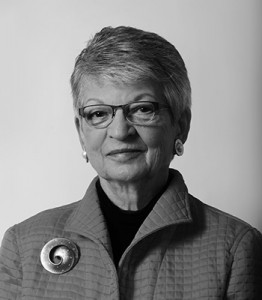 Joy Corning
Joy Corning
Former Iowa lieutenant governor
Written by Mary Riche
Joy Corning’s accomplishments as a public servant are so well known that she may be the only person surprised by this recognition as a Sage Over 70.
Her passion for equality and social justice has made her a leader of progressive change in Iowa. An independent thinker, she vigorously champions any cause she supports with wisdom, grace and grit.
I saw those qualities in action at this year’s Iowa State Fair. As part of our annual fair visit, I accompany her to the Iowa Republican Party booth, and she goes with me to the Iowa Democratic Party booth. This year, when she asked her party’s volunteers where she could sign up as a pro-choice supporter, she was told, “We don’t talk about that.” Joy smiled, remained composed and replied in her charming style, “Well, I do.”
Joy is perhaps best known as Iowa’s lieutenant governor from 1991 to 1999. But her political involvement didn’t end when she left public office. Currently, she serves as honorary co-chair, with former Lt. Gov. Sally Pederson, of Justice Not Politics, and as a board member for 50/50 in 2020, which has the goal of electing women to at least 50 percent of statewide elective offices by 2020.
Joy’s legacy extends beyond politics, though. Her philanthropic efforts have benefited Planned Parenthood of the Heartland, the Des Moines Symphony and numerous other organizations.
Joy’s personal life has been as successful as her public one. She married Burt Corning in 1955, and the couple settled in Cedar Falls, where they raised three daughters. Though Burt (who died in 1990) liked to joke about how Joy didn’t cook, he admired the organizational skills she honed while running the household: She created a color-coding system to efficiently sort duplicate items—napkin rings, toothbrushes, towels. Not too surprisingly, she chose the color red for herself. Burt was assigned brown, and the girls were given blue, yellow and green, representing the sky, sun and grass.
Our friendship began over coffee after church when she was looking for a bridge partner. Since then, we’ve shared many vacations, glasses of wine and stories—Joy has a story for every situation. Lately, we’ve leaned on each other when encountering the speed bumps of life.
Last year, Joy invited 80 women friends to her condominium to celebrate her 80th birthday. She insisted there be no gifts, only funny, sexy or sentimental cards. My favorite moments came after the guests had gone, and Joy read aloud the messages in those cards. We laughed until we cried!
Joy is simply unforgettable, and she leaves a positive impression on whomever she meets. After hearing Joy speak to his elementary school class in 1984, a young boy wrote: “Dear Mrs. Corning, Thank you for visiting our class. I hope you win the election. When I am eighteen, I will vote for you if you’re not dead then.”
Joy not only is alive, but she continues to serve as a vibrant role model to women of all ages.
And now she’s also a Sage Over 70.
Congratulations, Joy!
Mary Riche is a psychotherapist in private practice in Des Moines.
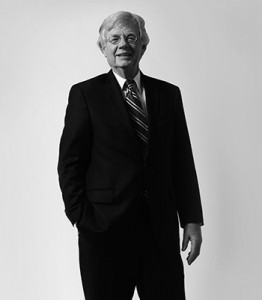 E.J. Giovannetti
E.J. Giovannetti
Attorney, Hopkins & Huebner P.C.; former Polk County supervisor and Urbandale mayor
Written by Robert Brownell
I’ve known E.J. Giovannetti for so long, I can’t remember when I actually met him. I feel as if I’ve known him since before I was even transferred to Des Moines years ago. But that’d be impossible. You can’t know people without actually meeting them, can you?
I do remember, though, when he deigned to meet with me. By the time that day rolled around in 1993, he was already a legend around Greater Des Moines. E.J. had been mayor of Urbandale for some 16 years.
I had just been elected mayor of Clive. Within two days of the election, E.J. called and asked me to join him for lunch. I was honored. E.J. Giovannetti, the celebrated mayor of mighty Urbandale, asking me, a person with less than one week of experience as a mayor, my shoes still slightly covered with the dust of Cedar Rapids. And my city seemed much less significant on the metro scene than E.J.’s. To me, it was a big deal. I wore my best suit. I even cut my fingernails.
We went where he liked to go for lunch: Noah’s Ark on Ingersoll Avenue. He ordered cavatelli. I can’t remember what I had. But I remember E.J.’s cavatelli because, as he talked to me about politics and Des Moines and living in the public eye, he straightened the penne pasta into neat rows, four abreast and lined up, spotted red in Noah’s tomato sauce, all in the same direction from one end of the small oval dish to the other. I’d never seen anyone do that. Not before and not since.
But E.J. did, and I thought it told me a little about how he thinks. I concluded that he was an organized guy and that he liked things to be predictable. What a strange avocation—politics—for a person who must thrive on predictability.
As it turned out, I was only partly right.
He certainly brought organized thinking to any issue he tackled, both as mayor and later as a Polk County supervisor. But as he dealt with sewers, the public transportation system, water distribution and so many other features of the metro landscape, and as he put a system in place that proved invaluable to helping victims of sexual abuse, I found it was not predictability he desired.
Instead, his greatest desire is to bring predictability to others. To the Des Moines metro area, to his legal clients, to the people he serves, E.J. aspires to bring stability.
As he sat at Noah’s so many years ago arranging his cavatelli, taking the time to mentor someone he didn’t really know, he became something else, at least to me. He became a friend, the kind of friend with whom you can’t really remember when he wasn’t a friend. When life clumped along without him.
Much as he has been to me, E.J. is a friend to Greater Des Moines, too. A friend we can’t collectively remember how we’d have gotten along without. This town doesn’t need to meet him in order to know him.
Robert Brownell is serving his fourth term on the Polk County Board of Supervisors. He’s also the author of the recently published book “Our Fathers Day: A Baseball Card From the Plains.”
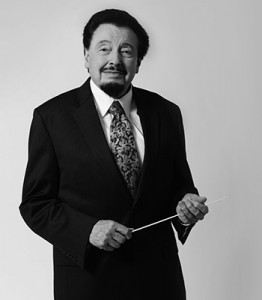 Robert Larsen
Robert Larsen
Art Director Emeritus, Des Moines Metro Opera
Written by Michael Egel
One hot summer afternoon in 1988 when I was 14, I was flipping through TV channels and landed on Iowa Public Television, which at the time was broadcasting a performance of Des Moines Metro Opera’s “The Barber of Seville.” It was intermission, and the moderator was interviewing Robert Larsen. I was transfixed; it was the first time I encountered Robert’s intense passion and strong vision for music.
That passion and vision led me to find my way to this magnificent art form, and for that, I will be eternally grateful. I’m not alone; over the decades, Robert’s joy has inspired everyone who’s had the privilege to work alongside him—be they students, colleagues or professionals—with the same awe and wonder that I imagine surrounded his earliest memories of life and music.
Robert was born in Walnut, Iowa, and against the backdrop of that small community, he developed an unlikely interest in opera. He would listen to Saturday afternoon radio broadcasts from the Metropolitan Opera, and he tells of how he practically wore out his elementary school’s Compton Encyclopedia set, trying to learn all he could about this remarkable art form.
In 1962, Robert received an offer many musicians can only envy: a contract as an assistant conductor with the Metropolitan Opera. He turned it down. “If I took the Met post, I knew how my entire life would unfold,” he said.
“Far more interesting to me were the two prospects that staying in Iowa presented: teaching young talent and bringing professional opera to a part of the country that had never had it.”
And so he stayed. After receiving a doctorate from Indiana University, Robert, with a mere $22,000, launched Des Moines Metro Opera in the summer of 1973. That first season, professional singers worked alongside Simpson College students to create something out of nothing via sheer determination and loyalty to their beloved leader. For the following 37 seasons, Robert served as the company’s artistic director, stage director and conductor. That means that he gave musical and stage direction to nearly 120 productions, an accomplishment I would dare say has never been equaled in the musical world in the United States or any other country.
I’ve had the privilege of learning from Robert since I joined the company in 1999. In fact, I chose Des Moines over New York because I wanted to work with him. On a big-picture scale, his example has shown me that seemingly impossible achievements can be reached through determination, vision and an incredible work ethic. During our grueling audition trips to New York, during which we would hear over 400 singers from 8 a.m. to 6 p.m., take in an evening performance at the Metropolitan Opera and then collapse afterward, I always marveled that Robert would meet me in the hotel lobby at 8 a.m., having been awake since 5 a.m. writing 50 postcards to high school students who were prospective music majors at Simpson College. He just never stopped working and moving forward!
Robert, the strength of your vision to bring opera to the Midwest has grown into a unique and remarkable company, and in so doing, you have forever changed all of our lives.
Michael Egel is artistic director of Des Moines Metro Opera.
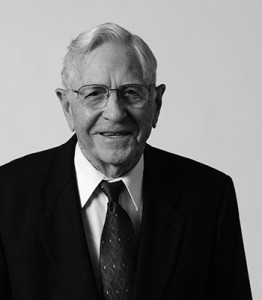 Neal Smith
Neal Smith
Former member of the U.S. House of Representatives
Written by Gov. Chet Culver
For more than a half-century, Neal Smith represented our nation and state with dedication, integrity and commitment. He began his career in public service as a bomber pilot in World War II, returning home with a Purple Heart and as a true war hero. After graduating from Drake University Law School, he became a prosecutor in Polk County and was elected to the U.S. House of Representatives in 1958, where he served for 36 distinguished years.
During his tenure in Washington, D.C., America and the world changed. When he took office, Dwight D. Eisenhower was president, and the Cold War was in its first years. By the time he left the House of Representatives, he had served with nine presidents, and the Soviet Union was no more.
He served through a period of immense challenges for our country, but he saw these challenges as opportunities. He quickly worked his way through the ranks of the House with optimism, determination and drive. With his work, and with how he did it, he made the country more fair. He made our government more representative of our people. And, it should be noted, he didn’t do this alone. Neal and Bea Smith have always been a team in service, and they have both earned our gratitude.
His efforts in Congress represent the Iowa values of hard work and common sense. Nutrition, fairness for farmers and rural America, protections for senior citizens, economic growth, education, public safety—the list of his accomplishments is long. His positive impact on national public policy can’t be overstated.
But even as his influence extends across the entire country, it’s important to recognize that here, in Des Moines, he’s our neighbor and our friend. And his commitment to Iowa is as strong today as it was when he returned home as a young veteran. For example, a generation of Iowans have learned about conservation at the Neal Smith Wildlife Refuge. The Saylorville and Red Rock dams and lakes have provided wonderful recreational opportunities for families while also keeping Iowans safe from flooding. Finally, the Neal and Bea Smith Legal Clinic at Drake Law School not only provides assistance to low-income Iowans, it also is a training ground for young law students, preparing them for careers in law and public service.
So, it can be said that Neal Smith’s legacy is one of service to our state and our nation. I am proud to offer him my thanks for his years of service to Iowa and the country and my sincere congratulations for his recognition as a Sage Over 70.
Chet Culver was governor of Iowa from 2007 to 2011. He currently runs The Culver Group, an energy consulting firm.









